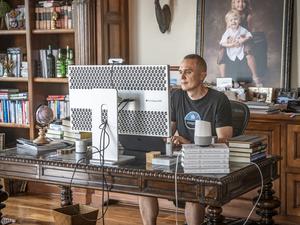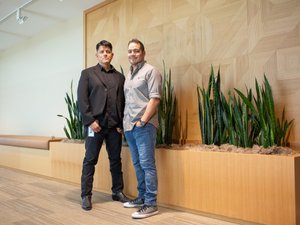Jason Seats has been the face of the Austin and San Antonio Techstars programs for about four years. Now, he's stepping down from his role as managing director and handing the reins to Amos Schwartzfarb. Seats now focuses on his role as a partner in Techstars' $150 million venture capital fund.
Austin Inno put a few questions to Seats via email about his new role, some of Techstars' recent investments and the leaner times that are likely to come to the startup and venture capital ecosystems in Austin.
Let's jump right in.
Austin Inno: You recently took on a new role with Techstars as partner of its $150M VC fund. What is your new job like on a day-to-day basis?
Jason Seats: One of the things I love about being an investor is how varied my days are. We have such a large portfolio right now that on any given day I'm talking with a company at every stage of the lifecycle, from newly formed to managing acquisitions (or orderly shutdown as is the case many times as well). When I'm not directly trying to be helpful to a past investment, I spend as much time as I can meeting new companies and learning as much as possible about new technologies and industries I'm unfamiliar with.
Austin Inno: Techstars VC fund typically is a co-investor in companies that grow out of the accelerator programs. What are a few of the companies the fund recently invested in -- both locally and worldwide -- and what set those companies apart?
If we want to have truly global scale companies grown in Austin, we need to think about problems that are larger than this city. And when we have successes, the story shouldn't be 'Austin', it should be the company that had the success.
Jason Seats: We invest in companies that come through our accelerators, but also companies founded by our alumni and mentors. A local Austin example of a company we invested in from the fund is PivotFreight. The company went through the 2014 program here in Austin, and after the program a local mentor, Rob Taylor, joined them as CEO. PivotFreight is a software platform for large freight shippers. It's a huge and underserved market and the team is uniquely qualified to tackle the opportunity.
Another example of a Techstars accelerator company that we've invested in is Distil Networks. They went through our Techstars Cloud program in San Antonio, but are based in San Francisco. Distil helps protect websites from malicious bots, or automated software that attempts to break into websites or steal content. Distil is helping to create the category of bot protection/management. This is a huge problem plaguing many different verticals, and they are having a lot of early success with well-known enterprise customers already.
The last example I'll give you is MacroFab, a reimagined hardware manufacturer based in Houston, TX. We met the CEO of MacroFab when he was a mentor for Techstars. We see firsthand the struggles that most hardware startups have actually getting their products built, built right and set up to scale. MacroFab has a vision to change hardware manufacturing in the same way that cloud changed hosting. Agile, on-demand, flexible and transparent.
Austin Inno: We've been reading a lot lately about startups needing to prepare for leaner times ahead. How do you see venture capitalists changing their investment philosophies in the next six months to a year?
Jason Seats: First it's worth pointing out that no one can call market cycles. There are certainly lean times coming, we just don't know when. Could be next year, could be 5 years away. It's always a valuable exercise though to think about how the macro can affect your position.
I actually don't see VC changing all that much on the investment side. Right now there is little fear in the market, so in a pull-back we'll clearly see collapsing valuations and more thoughtful deal making, but in general most funds are going to invest the same amount of money at the same pace regardless of the macro.
The two areas that will be affected quite a bit though are at the institutional LP level and inside of startups themselves. Institutional LPs are the investors in venture funds. They are large pools of capital and are entities like state pension funds, school endowments, sovereign wealth funds, etc. When the market turns, many LPs pull back hard on their deployment of new capital to venture as an asset class as their only heavy-handed mechanism of maintaining their asset allocation strategy. This makes it very hard for VC funds to raise money, and as a result you'll see the death of young firms, firms with weak track records, and strain overall on fund size even at successful firms.
This ultimately has a trickle down effect of less venture capital available to startups. So while an individual VC who is lucky enough to raise a fund in that environment is likely to invest similarly to how they would in a 'normal' market, there are just less of them, which means a shift in the demand/supply balance of investment. Inside of a startup in a tough market, being profitable is your target. When the capital markets are shaky it's obviously in your best interest to not need them. For healthy businesses in a strong capital position, these markets represent great opportunities to expand and gain market share when your competitors may be stuck just trying to keep the lights on.
Austin is an emerging tech city. That's a good thing! But it's still early days.
Austin Inno: What do you think are the biggest risks to the Austin innovation ecosystem in the next 1-5 years?
Jason Seats: One risk I see in Austin is too much of a focus on Austin. It's great to have a lot of local pride and to lean into all of the amazing organizations and events that we have right here on our doorstep, but it's also all too easy to drink the kool-aid and believe your own hype.
Austin is an emerging tech city. That's a good thing! But it's still early days, and we've got to have a long term view and patience to let the ecosystem develop. If we want to have truly global scale companies grown in Austin, we need to think about problems that are larger than this city. And when we have successes, the story shouldn't be 'Austin', it should be the company that had the success. There is too much thinking locally around finding the 'next great Austin company'. I personally feel that this kind of framing is severely limiting because it causes you to think of existing Austin companies as reference points. Let's set our sights higher.
Austin Inno: What do you think is the most valuable piece of advice you can give to Austin area startups?
Jason Seats: I'll steal some ancient wisdom in the form of the most generic advice ever given: This too shall pass.







